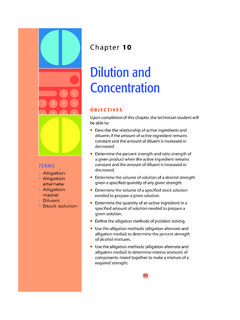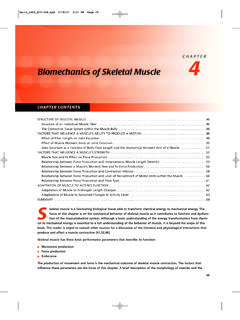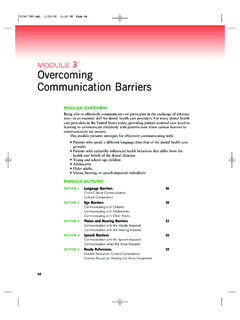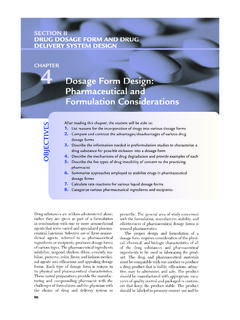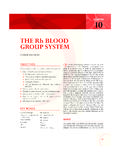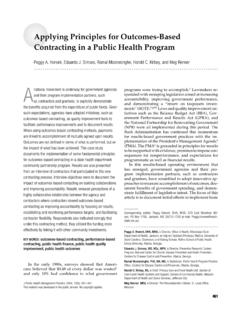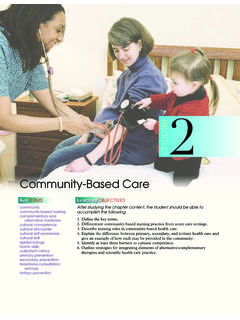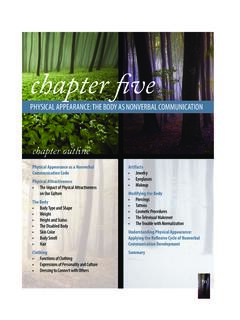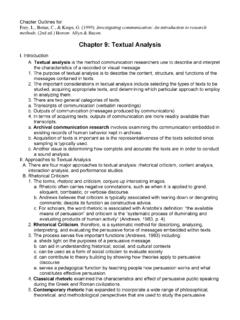Transcription of CHAPTER Listening and Empathic Responding 5
1 50 Overview Listening to patients trying to understand their thoughts and feelings is crucialto effective communication . However, Empathic communication requires morethan understanding. The understanding you have must be conveyed back topatients so they know you understand. In addition, you must genuinely care aboutpatients and not be afraid to communicate your concern to them. Finally, patientfeelings must be accepted without judgment as to being right or wrong. Thischapter examines various skills involved in Listening and Empathic attitudes essential to Empathic communication and the effects of such com-munication on pharmacist patient relationships are also explored.
2 Listening Well When we think about skills of effective communication , we probably think first ofthe skills involved in speaking clearly and forcefully, in having an effect on othersbased on what we say. However, an equally critical part of the communicationprocess, and perhaps the most difficult to learn, is the ability to be a good have probably experienced a sense of satisfaction and gratitude when you havefelt that another person really listened to what you had to say and, to a large extent,understood your meaning. In the relationship between a health professional andpatient, the patient s feeling of being understood is therapeutic in and of itself.
3 Ithelps to ameliorate the sense of isolation and helplessness that accompanies apatient s experience of illness and his or her frustration in negotiating the health caresystem. Your ability as a pharmacist to provide your patients with the sense that theyare understood is a crucial part of your effectiveness in communicating with them. Listening and Empathic Responding5 CHAPTERL istening WellEmpathic RespondingAttitudes Underlying EmpathyNonverbal Aspects of EmpathyProblems in Establishing Helping 11/3/06 8:26 PM Page 50 CHAPTER 2 described the components of the interpersonal communicationmodel and explained the importance of the feedback loop to effective communi-cation.
4 As the receiver of messages, your ability to listen well influences the accu-racy with which you are able to decode messages in a way that is congruent withpatients intended messages. In addition, your ability to convey your understand-ing back to patients will affect the degree to which they feel understood andcared for. If you fail to understand the patient, this can be uncovered and clari-fied in the feedback process. If your attempt to listen and understand is genuine,even missing the mark will not be damaging if the overall message being con-veyed is one of caring and acceptance.
5 In addition to the communication barriers discussed in previous chapters, somecommunication habits can interfere with your ability to listen well. Trying to do twothings at once makes it evident that patients do not have your full attention. Planningahead to what you will say next interferes with actively trying to understand the mean-ing of patients communication . Jumping to conclusions before patients have com-pleted their messages can lead to only hearing parts of messages often pieces thatfit into preconceived ideas you have. Focusing only on content, judging the person orthe message as it is being conveyed, faking interest, communicating in stereotypedways all cause us to miss much of the meaning in the messages people send us.
6 CHAPTER 5 / Listening AND Empathic RESPONDING51 How can the pharmacist improve his attending behaviors? 11/3/06 8:26 PM Page 51 Listening well involves understanding both the content of the informationbeing provided and the feelings being conveyed. Skills that are useful in effectivelistening include: 1) summarizing, 2) paraphrasing, and 3) Empathic Responding , as described below, includes reflection of feeling state-ments that verbally convey your understanding of the essence or emotionalmeaning of another person s communication . In addition, nonverbal communica -tion that shows caring and attention to the patient is a crucial component of effec-tive Listening .
7 SUMMARIZING When a patient is providing information, such as during a medication historyinterview, it is necessary for you to try to summarize the critical pieces of infor-mation. Summarizing allows you to be sure you understood accurately all that thepatient conveyed and allows the patient to add new information that may havebeen forgotten. Frequent summary statements serve to identify misunderstand-ings that may exist, especially when there are barriers in communication , such aslanguage When using this technique, you attempt to convey back to the patient theessence of what he or she has just said.
8 Paraphrasing condenses aspects ofcontent as well as some superficial recognition of the patient s attitudes orfeelings. The following are examples of paraphrasing: Patient #1:I don t know about my doctor. One time I go to him and he sas nice as he can be. The next time he s so rude I swear I won t go backagain. Pharmacist #1:He seems to be very #2:I m glad I moved into the retirement village. Every day there issomething new to do. There are always lots of things going on I m neverbored. Pharmacist #2:So there are a lot of activities to choose from.
9 Empathic Responding EMPATHY DEFINEDMany of the messages patients send to you involve the way they feel about their illnesses or life situations. If you are able to communicate back to a patientthat you understand these feelings, then a caring, trusting relationship can beestablished. Communicating that you understand another person s feelings is apowerful way of establishing rapport and is a necessary ingredient in any SKILLS IN PHARMACY 11/3/06 8:26 PM Page 52 THEORETICAL FOUNDATIONSThe importance of empathy in helping relationships has been elucidated mosteloquently by psychologist Carl Rogers.
10 Rogers developed person-centered psy-chotherapy, which is part of a humanistic tradition in psychology. Central is thebelief that, if individuals are able to express themselves honestly in an accepting,caring atmosphere, they will naturally make healthy, self-actualizing decisions forthemselves. In such an environment, people are able to reach solutions to theiremotional problems that are right for them. Thus, pharmacists can be helpful byproviding a Listening ear to help patients clarify feelings. The ability to listeneffectively to the emotional meaning in a patient message is the essence of empa-thy.
